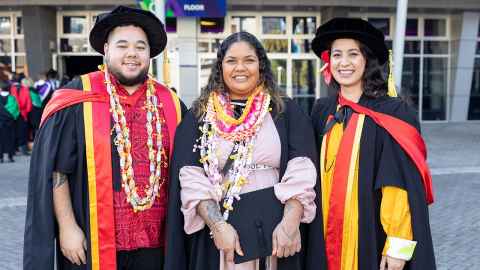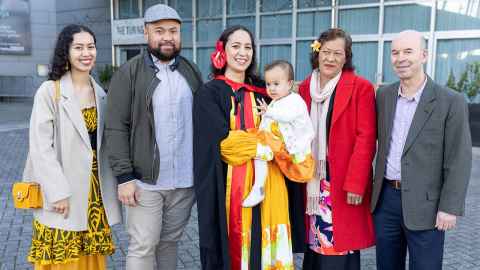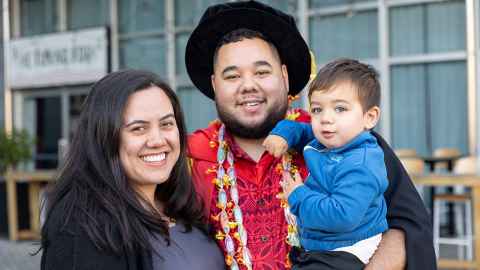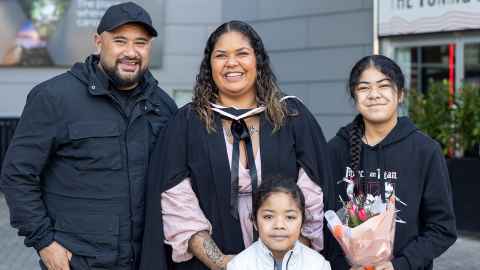Pride in Pacific Studies postgraduate success
5 August 2022
August graduation saw three postgraduate students cross the stage from the School of Pacific Studies, with two doctoral and one masters student capped.

Dr Therese Lautua, Dr Caleb Marsters and Emmaline Pickering-Martin all received their degrees in the ceremony at Spark Arena on 3 August.
Dr Lautua is a theologian and researcher from South Auckland. The experiences of having mixed cultural heritage from Samoa (Tulaele, Lalomanu, Poutasi, Amaile) and Aotearoa (NZ European), as well as her Catholic faith, have inspired her research pursuits in the areas of theology, Pacific identity and mental well-being.
This interdisciplinary approach is grounded in her passion for creating meaningful research that has practical outcomes for Pacific peoples and local church communities.
Dr Lautua’s thesis, ‘But who do you say I am? Images of God, Pacific young women and mental well-being’, focused on young multi-ethnic, Pacific, Catholic women’s understanding of God and how these can affect or harm their mental well-being.
She says her favourite part of the process was speaking to the research participants and hearing their stories of how family life, culture, their faith and the natural environment are all woven together.
I learnt that I can honestly express myself through research, even when I feel as though I’m not good enough to belong in academia.

“I hope the research and future related projects can help young people in church communities know that they are always loved and can face life’s challenges with a village around them,” she says.
Therese says the process of getting her doctorate was a whirlwind and took effort and care, but also came with great personal growth.
“The PhD was a juggling act, working full time with the UniBound Programme at the University, family life and church involvement. I learnt that I can honestly express myself through research, even when I feel as though I’m not good enough to belong in academia. It’s okay to be Samoan and Palagi and talk about issues important to our people because the world needs to hear our voices.”
Being both a māmā and an academic, she is confident in her responsibility to her whānau and her people.
“Our pepe is named ‘Kiely’ – my maiden name, ‘Anna-Sifa’ after her two grandmothers and ‘Lautua’ my husband’s family name. I think being an academic and a māmā means having a responsibility to tell the stories of her genealogies. It’s teaching her the importance of questioning our faith, colonial structures and seeking the common good for all people, especially the most vulnerable in society.”

Dr Caleb Marsters is a lecturer at Te Wānanga o Waipapa, School of Māori Studies and Pacific Studies.
He is of Cook Island (Rarotonga/Takitumu/Ngati Uirangi and Palmerston) and New Zealand Papa'a descent. His PhD thesis, ‘Run it straight: Young Pacific male athletes and positive mental well-being’, focused on the athletes’ perceptions of what contributes to positive mental well-being and peak performance at an elite level of sport.
His research outlined the importance of culturally competent coaching and support staff in sport.
“It’s vital that elite organisations and their staff understand the lived realities and wider kinship obligations facing young Pacific male athletes away from sports.”
We need to change toxic norms, break the stigma around certain issues, and empower our Pacific youth to be all that they can be.
Caleb says many young Pacific male athletes ‘mask’ their true feelings and emotions. Key risk periods include following injury, transitioning into the senior elite level, deselection, following athlete suicide deaths, and following performance difficulties linked to mental health difficulties.
“We need to change toxic norms, break the stigma around certain issues, and empower our Pacific youth to be all that they can be.
“Being a dad makes me realise that everyday things are what matter the most. Spending and making time for your loved ones and also leaving the world in a better way for your kids and future generations - socially, politically, spiritually, and environmentally.”
He is currently the principal investigator for the Health Research Council- funded project 'The importance of informal mental health help-seeking for Pacific men in New Zealand', which hopes to bring Pacific men’s experiences to the fore by exploring the efficacy of informal help-seeking for mild-to-moderate mental health challenges for Pacific men.
“My PhD research has also changed my approach to teaching, knowing that our students are here as a result of generations of hard work and care. I know if my son was at university, I would want to know that the lecturers and staff are looking out for him, both academically and away from studies.
"So I try to do that for each student – making sure they feel supported and empowered to achieve their goals.”

Emmaline Pickering-Martin graduated with a Master of Arts with First Class Honours in Pacific Studies.
Her thesis was, ‘Na gaunisala me vakavinakataki kina na bula ni vakasama: The way towards positive mental well-being: frontline perspectives of the mental health system in Fiji.'
Emmaline says writing a masters thesis during a pandemic proved an interesting experience.
“It was tough finding space and time to write during lockdowns, having three kids at home all trying to learn at the same time with limited devices and bad internet connectivity. It meant all of my writing was done between 1am and 4am. It was an interesting juggle between my study, teaching in Pacific Studies and being a mum.”
Caleb and Therese's mahi in mental health and well-being is so important. It's a reminder that we, as Pacific peoples, are so capable and intelligent. We are change makers.
Emmaline is inspired by her friends who continue to pursue their studies, especially Caleb and Therese whom she graduated alongside.
“Watching my friends smash their PhD study and then graduate is so inspiring. I love to see our Pacific students in all their academic pursuits walking across that stage and then seeing everyone outside with proud friends and whānau - it just brings me so much joy.
“I have been lucky enough to work alongside both Caleb and Therese and their mahi in mental health and well-being is so important, and is a reminder that we, as Pacific peoples, are so capable and intelligent. We are change makers.”
The delayed spring graduation held in early August saw 1,572 students gain their qualifications.
Media contact
Julianne Evans | Media adviser
M: 027 562 5868
E: julianne.evans@auckland.ac.nz